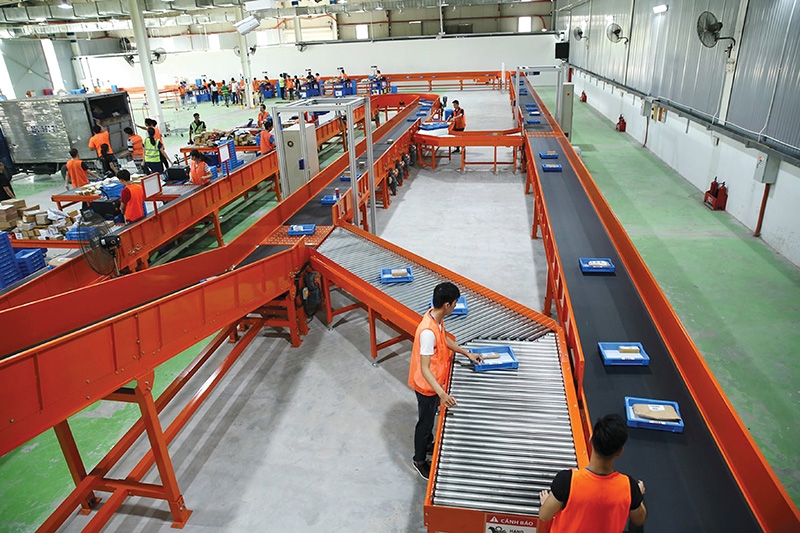Digitalisation aiding supply chain strength
 |
| Businesses can save millions of US dollars through successful digitalisation of supply chains, photo Le Toan |
James Christopher, president of TM Insight Asia, cited the company’s latest report that 98 per cent of business leaders in Vietnam plan to adopt more forms of digitalisation in supply chains. This is to enable them to better overcome challenges and changing consumer trends presented not only by the ongoing pandemic but also other significant events from 2020 including trade disputes.
Christopher added that the digitalisation of supply chains will allow businesses in Vietnam to better cope with the upswing in demand, which cannot always be covered with increasing manual operations. It will also allow for better visibility of what is happening within their supply chains, and potential challenges can be anticipated better before they arise.
According to the December report from TM Insight, which surveyed over 250 business leaders across various sectors in five ASEAN member states, going digital also helps to build resilience of supply chains against potential shocks, allowing companies to remain competitive even in an ever-changing landscape.
Indeed, Vietnamese manufacturers and companies are planning their next technology investments to optimise their supply chain as global markets continue to recover. VinFast in particular has made significant investment in robotics and automation, helping the group improve productivity and build supply chain resilience. Retailer Saigon Co.op has also increasingly implemented online-to-offline business to accelerate digital transformation in management and operation of its supply chain.
Kurt Binh, CEO of Smartlog, a technology startup for logistics industry said, “We realise the huge potential of the Vietnamese market. By digitalising supply chains, companies can cut hundreds of millions of US dollars. At the same time, digital transformation can make supply chain more agile and closer to end users. It also increases the interaction within supply chains to improve services and reduce logistics costs.”
Binh added that most Vietnamese companies consider supply chain digitalisation as expenses rather than profitability. “Thus, Vietnamese businesses need to change the leadership mindset, culture, and attitude to remove these barriers,” he said, adding that Smartlog will help local companies implement the digitalisation process with an end-to-end logistics ecosystem.
According to Grant Thornton’s Business Pandemic Resiliency Diagnostic, conducted in the summer of 2020, the supply chain was the factor which contributed most to a drop in business, more so than cash flow, demand, regulation, or technology. The survey also revealed that companies with a higher level of digitalisation were more resilient and weathered the pandemic storm better than companies with a low level of adoption of digital adoption.
“Digitalisation allows greater market reach and more efficient price discovery, both for buyer and seller.,” explained Claude Spiese, senior advisor of Digital Advisory Services at Grant Thornton Vietnam. “Whereas traditionally businesses were limited in their supplier and distributor relationships, with digital they may discover and then buy and sell to a much larger pool of business partners, often at more favorable price levels.”.
Observing this trend, Elizabeth Fuller, head of Growth at WeWork Southeast Asia, told VIR, “The investment in digital infrastructure and connectivity has also played an important feature both in the management of the pandemic and the functioning of the economy. As a data and technology enabled company, we are seeing companies developing new business models and engagement across emerging sectors like e-commerce to traditional sectors such as banks. The pandemic will accelerate such trends even further and savvier companies will turn towards an integrated digital experience to hit their customer base.”
She noted that the Vietnamese market has also shown an increase in activity. Many international enterprises have invested and expanded their presence here in recent years, which has created a need for companies to continue being nimble and agile to maintain their competitive edge, which often leads them to embrace flexible workspace solutions.
In the last quarter, WeWork also signed on a fast-moving consumer goods company along with some regional startups looking at Vietnam as a huge market for their future strategies.
What the stars mean:
★ Poor ★ ★ Promising ★★★ Good ★★★★ Very good ★★★★★ Exceptional
Themes: Digital Transformation
- Dassault Systèmes and Nvidia to build platform powering virtual twins
- Sci-tech sector sees January revenue growth of 23 per cent
- Advanced semiconductor testing and packaging plant to become operational in 2027
- BIM and ISO 19650 seen as key to improving project efficiency
- Viettel starts construction of semiconductor chip production plant
Related Contents
Latest News
More News
- State corporations poised to drive 2026 growth (February 03, 2026 | 13:58)
- Why high-tech talent will define Vietnam’s growth (February 02, 2026 | 10:47)
- FMCG resilience amid varying storms (February 02, 2026 | 10:00)
- Customs reforms strengthen business confidence, support trade growth (February 01, 2026 | 08:20)
- Vietnam and US to launch sixth trade negotiation round (January 30, 2026 | 15:19)
- Digital publishing emerges as key growth driver in Vietnam (January 30, 2026 | 10:59)
- EVN signs key contract for Tri An hydropower expansion (January 30, 2026 | 10:57)
- Vietnam to lead trade growth in ASEAN (January 29, 2026 | 15:08)
- Carlsberg Vietnam delivers Lunar New Year support in central region (January 28, 2026 | 17:19)
- TikTok penalised $35,000 in Vietnam for consumer protection violations (January 28, 2026 | 17:15)

 Tag:
Tag:




















 Mobile Version
Mobile Version